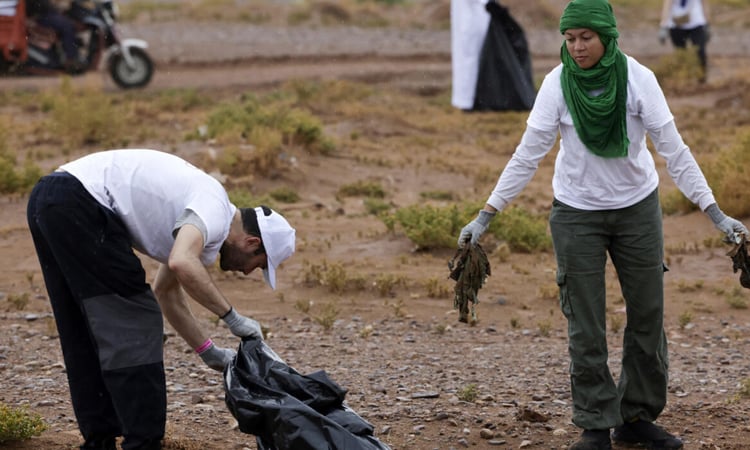
M’HAMID EL GHIZLANE (Morocco), April 22 (NNN-AGENCIES) — It may be the gateway to the vast Sahara desert, but that doesn’t mean it’s free of that modern scourge of the environment — the rubbish humanity discards.
In southern Morocco, volunteers are hunting for waste embedded in the sand, and they don’t have to look far.
Bottles, plastic bags — “there are all kinds”, noted one helper who has come forward to join the initiative cleaning up the edge of a village bordering the Sahara.
The initiative marks the 20th International Nomads Festival, which is held in mid-April every year in M’Hamid El Ghizlane in Zagora province in southeast Morocco.
Some 50 people, gloved and equipped with rubbish bags, toiled away for five hours — and collected between 400 and 600 kilos of waste, the organisers estimated.
“Clean-up initiatives usually focus on beaches and forests,” festival founder Nouredine Bougrab, who lives in the village of some 6,600 people, said.
“But the desert also suffers from pollution.”
The campaign brings together artists, activists and foreign tourists, and is a call for the “world’s deserts to be protected”, said the 46-year-old.
Bougrab said the clean-up began at the northern entrance of the village “which was badly affected by pollution” and extended through to the other end of town and the beginning of the “Great Desert”.
The rubbish is “mainly linked to the massive production of plastic products, low recycling rates and atmospheric pollutants carried by the wind”, said anthropologist Mustapha Naimi.
Morocco has a population of almost 37 million and they generate about 8.2 million tons of household waste each year, according to the Ministry of Energy Transition and Sustainable Development.
“This is equivalent to 811 times the weight of the Eiffel Tower — enough to fill 2,780 Olympic swimming pools with compacted waste,” said Hassan Chouaouta, an international expert in sustainable strategic development.
Of this amount, “between six and seven percent” is recycled, he said.
Their morning alarm went off “early”, according to one volunteer, New York-based French photographer Ronald Le Floch who said the initiative’s aim was “to show that it’s important to take care of this type of environment”.
Another helper was Ousmane Ag Oumar, a 35-year-old Malian member of Imarhan Timbuktu, a Tuareg blues group.
He called the waste a direct danger to livestock, which are essential to the subsistence of nomadic communities.
Anthropologist Naimi agreed: “Plastic waste harms the Saharan environment as it contaminates the land, pasture, rivers and nomadic areas,” he said.
Pastoral nomadism is a millennia-old way of life based on seasonal mobility and available pasture for livestock.
But it is on the wane in Morocco, weakened by climate change and with nomadic communities now tending to stay in one place.
The most recent official census of nomads in Morocco dates to 2014, and returned a nomadic population of 25,274 — 63 percent lower than a decade earlier in 2004.
Mohammed Mahdi, a professor of rural sociology, said the country’s nomads have “not benefited from much state support, compared to subsidies granted to agriculture, especially for products intended for export”.
“We give very little to nomadic herders, and a good number have gone bankrupt and given up,” he said.
Mohamed Oujaa,50, is leader of The Sand Pigeons group who specialise in the “gnawa” music practised in the Maghreb by the descendants of black slaves.
For him, a clean environment is vital for future generations, and he hopes the initiative will be “just the first in a series of campaigns to clean up the desert”. — NNN-AGENCIES


